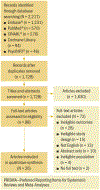Systematic Review of Cognitive Impairment in Colorectal Cancer Survivors Who Received Chemotherapy
- PMID: 34673756
- PMCID: PMC8666003
- DOI: 10.1188/21.ONF.634-647
Systematic Review of Cognitive Impairment in Colorectal Cancer Survivors Who Received Chemotherapy
Abstract
Problem identification: Cognitive impairment is a common and troublesome side effect experienced by many cancer survivors. It can have a significant impact on survivors' ability to function and enjoy a high quality of life. However, most cognitive impairment research has focused on breast cancer survivors, despite the high rates of colorectal cancer and the toxicity of treatment agents in some colorectal cancer chemotherapeutic regimens, which have been linked to cognitive impairment. This review provides a novel synthesis of what is known about cognitive impairment in colorectal cancer survivors.
Literature search: CINAHL®, Cochrane Library, Embase®, PsycINFO®, and PubMed® were systematically searched by a health sciences librarian.
Data evaluation: Data were extracted across studies; findings about the prevalence, severity, and correlates of cognitive impairment were synthesized.
Synthesis: Across findings from 26 articles representing 24 independent studies, 13%-57% of participants had cognitive impairment. Potential demographic, physiologic, and psychological correlates of cognitive impairment were identified.
Implications for practice: Findings indicate a need to focus research and patient assessments on early identification of risk factors, assessing for existing cognitive deficits and testing interventions to decrease cognitive impairment in colorectal cancer survivors.
Keywords: chemotherapy; cognitive function; cognitive impairment; colorectal cancer.
Similar articles
-
A rapid and systematic review of the clinical effectiveness and cost-effectiveness of paclitaxel, docetaxel, gemcitabine and vinorelbine in non-small-cell lung cancer.Health Technol Assess. 2001;5(32):1-195. doi: 10.3310/hta5320. Health Technol Assess. 2001. PMID: 12065068
-
Interventions for promoting habitual exercise in people living with and beyond cancer.Cochrane Database Syst Rev. 2018 Sep 19;9(9):CD010192. doi: 10.1002/14651858.CD010192.pub3. Cochrane Database Syst Rev. 2018. PMID: 30229557 Free PMC article.
-
Clinical judgement by primary care physicians for the diagnosis of all-cause dementia or cognitive impairment in symptomatic people.Cochrane Database Syst Rev. 2022 Jun 16;6(6):CD012558. doi: 10.1002/14651858.CD012558.pub2. Cochrane Database Syst Rev. 2022. PMID: 35709018 Free PMC article.
-
The clinical effectiveness and cost-effectiveness of enzyme replacement therapy for Gaucher's disease: a systematic review.Health Technol Assess. 2006 Jul;10(24):iii-iv, ix-136. doi: 10.3310/hta10240. Health Technol Assess. 2006. PMID: 16796930
-
Taxane monotherapy regimens for the treatment of recurrent epithelial ovarian cancer.Cochrane Database Syst Rev. 2022 Jul 12;7(7):CD008766. doi: 10.1002/14651858.CD008766.pub3. Cochrane Database Syst Rev. 2022. PMID: 35866378 Free PMC article.
Cited by
-
The Impact of Bevacizumab and Chemotherapy on Quality of Life in Metastatic Colorectal Cancer Patients.Healthcare (Basel). 2023 Feb 16;11(4):591. doi: 10.3390/healthcare11040591. Healthcare (Basel). 2023. PMID: 36833125 Free PMC article.
-
Construction of a risk prediction model for postoperative cognitive dysfunction in colorectal cancer patients.World J Gastrointest Surg. 2025 Apr 27;17(4):104459. doi: 10.4240/wjgs.v17.i4.104459. World J Gastrointest Surg. 2025. PMID: 40291874 Free PMC article.
-
Comparative effectiveness of interventions for cancer treatment-related cognitive impairment in adult cancer survivors: protocol for a systematic review.Syst Rev. 2024 Aug 5;13(1):207. doi: 10.1186/s13643-024-02602-4. Syst Rev. 2024. PMID: 39103943 Free PMC article.
-
Assessment of cognitive function after surgery for colorectal cancer-a scoping review.BMJ Open. 2024 Dec 3;14(12):e080950. doi: 10.1136/bmjopen-2023-080950. BMJ Open. 2024. PMID: 39627132 Free PMC article.
-
Effectiveness of a Self-Esteem Enhancement Intervention Integrated into Standard CBT Protocol for Improving Quality of Life in Patients with Colorectal Cancer.Eur J Investig Health Psychol Educ. 2025 Mar 22;15(4):42. doi: 10.3390/ejihpe15040042. Eur J Investig Health Psychol Educ. 2025. PMID: 40277859 Free PMC article.
References
-
- Aaldriks AA, van der Geest LGM, Giltay EJ, le Cessie S, Portielje JEA, Tanis BC, … Maartense E (2013). Frailty and malnutrition predictive of mortality risk in older patients with advanced colorectal cancer receiving chemotherapy. Journal of Geriatric Oncology, 4(3), 218–226. 10.1016/j.jgo.2013.04.001 - DOI - PubMed
Publication types
MeSH terms
Grants and funding
LinkOut - more resources
Full Text Sources
Medical


